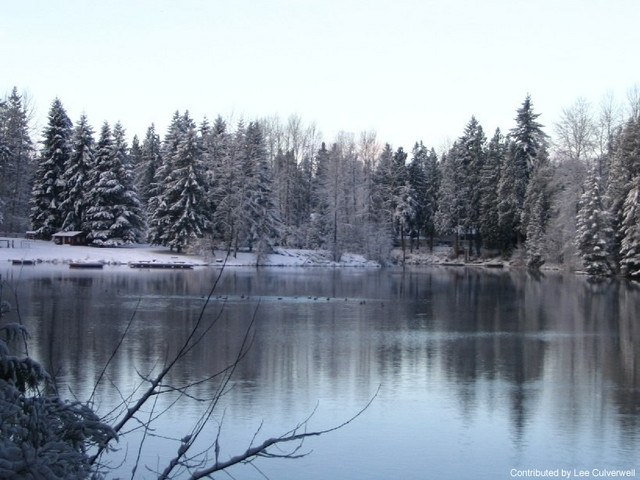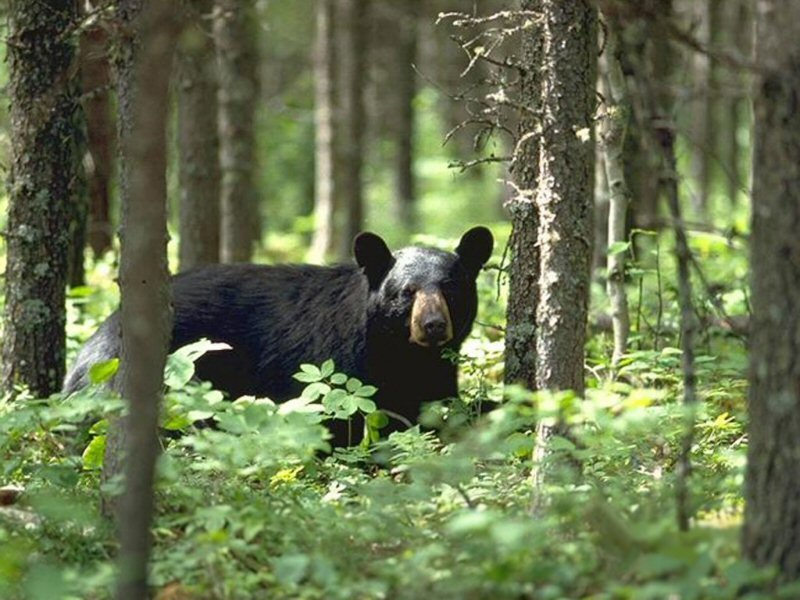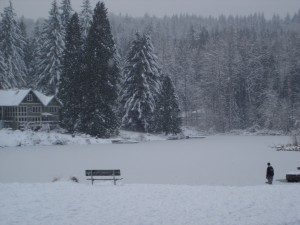Winter Contemplation #1 (or, how to get unfrozen)
I live by Lake Marcel, poised between the Snoqualmie Valley and the Cascade foothills, between the towns of Carnation and Duvall (east of Seattle). It is peaceful, idyllic. It looks like the kind of place you’d go to visit your financially-secure retired relatives in their second home… nestled between tall fir trees, near the community beach.

Part of my daily routine is to walk around the lake, weather allowing. I walk to stretch my legs, clear my mind, and… to listen. Sometimes, I hear Spirit speaking in Nature – perhaps through a bird or a tree, and often, through a living metaphor.
Oftentimes, the answers to the very questions I have been pondering are to be found in Creation – in Universal, Natural Law, clearly observable in the physical world. (For those who have ears to hear and eyes to see…)
As I’m writing my eBook on “Overcoming Financial Stress,” I’m thinking of how I manage and overcome financial stress – or any stress – in my own life. (Opt in to the right if you’d like a copy… it will be finished soon.)
“Stress” is fundamentally a fear-based reaction. It’s a fear-based reaction to the past: we’re afraid we’ve made terrible mistakes that we should feel regret over; and a fear-based reaction to the future: we may have food, shelter, and love today, but surely it will disappear tomorrow! And who would we BE without the income, the home, or the “stuff” we’ve come to identify ourselves with?
And perhaps things aren’t so great in the present. Perhaps we are confronted with uncomfortable challenges and find ourselves clinging to a past that no longer exists, discovering change the only constant. If only tomorrow were guaranteed to be like yesterday, if only we could predict it, manage it, control it!
A natural reaction to change, challenge, and fear is to “freeze.” When we encounter a bear (or a large barking dog on the sidewalk), we freeze in our tracks. Move no closer, move no further, make so sudden moves whatsoever.

We do that in life, too,especially when confronted with fear and stress.
Hate your job? Better stick it out – lest the dog of unemployment bite you.
In a bad relationship? Remain mired in the pain, frustration, and unhappiness, avoid facing your own emptiness and fear of being alone, or worse, unlovable.
In fear and denial of your growing personal debt, or the conspicuous absence of any savings? Whatever you do, don’t change your spending habits or get professional help! That might be uncomfortable, or worse, a signal to others that you don’t have it all together.
Just… freeze.
In The Magic of Thinking Big, David Schwartz affirms that most fear is psychological. (I.e., most of us encounter very few bears and genuine life-threatening circumstances.) However, that doesn’t mean the fears aren’t “real,” or that the “fear is all in your head” prescription will prove effective. On the contrary, the worry, panic, tension and dread borne of ill-used imagination (a client of mine calls it “Horrible-izing) is not likely to be “out-thought.”
Schwartz says there is only one cure for fear: Action.
“Action cures fear. Indecision and postponement, on the other hand, fertilize fear.”
I read those words last week, and thought of a question I’ve been asking lately when someone is in overwhelm (perhaps even myself): “What one thing can you do to improve this situation (move yourself forward, reach your goal, etc.)?
Inevitably, once one action is taken, another follows naturally. And another. (Getting to the gym can be the most difficult part of a work-out.)
We feel psychologically better, because it’s really no fun sitting in a fetal position hoping the bear doesn’t eat you. And we also feel better when we take action because we are “doing what we can,” lowering stress further when our actions produce shifts in the circumstances we are resisting.
Confidence builds. Doors open. Control softens (because only after you’ve done your part to change a situation can you accept whatever cannot be changed about it).
Two weeks ago, the days of freezing weather brought a layer of ice to Lake Marcel. Thick around the shore, cracked and unstable closer to the middle, ice covered the entire lake. Almost.

Lake Marcel in Winter Snow
This one section, a rather small, shallow section, refused to freeze. Tiny ripples bounced the setting sun towards my gaze. As I wondered what the difference was between the frozen lake and the unfrozen ripples, the answer was obvious.
A few dozen yards from the ripples, hidden beyond the grass and trees, I knew there to be a creek that brings fresh water to the lake. Water in motion, water in action. I realized a simple, profound truth:
It is almost impossible for water to freeze while it’s moving!
Action puts us into the present in a powerful way. (Interestingly enough, in writing the above paragraph, I found I had to switch from past to present tense in order to correctly describe the frozenness vs the active movement.) Action does not exist in the past or the future, and our power can only be found in the present moment.
Whatever is worrying you, troubling you, keeping you up at night… decide right now what one action you can take. Perhaps it’s an action, a phone call, or a conversation that you’ve been avoiding. And then… do it!
You might find that one action leading to another. You might discover a sense of peace or accomplishment, simply because you have done what you can do. You might discover the “bear” that had you “frozen” in your tracks wasn’t so scary – or so real – after all.
Happy “Thawing”!
Kate – I so enjoy reading your articles. It’s like you’re writing them just for me. They either answer some question I’ve been struggling with or name some emotion that I just couldn’t figure out. You are a wonderful writer and I look forward to every one. Thanks ~ Becky
This puts me in mind of a sermon by Laurie Wheeler that always stuck with me. It is simply not realistic to expect that only bad things are coming our way. If we don’t move forward, we can forestall many of the good things that are waiting for us as well. Rather than give in to the fear of the unknown, she recommended embracing “the joy of the unknown”.
Thanks for reading and taking the time to comment!
Becky, so glad to hear my posts and articles have been helpful.
Bryan, I love that thought – that it is unrealistic to expect only bad things coming our way, and we an only discover the good things by moving forward.
Thanks!
Kate
Hi-
Nice to say hello last night. Look forward to Tuesday!
Sorry for contacting you here; my Biznik is acting up.
Chris